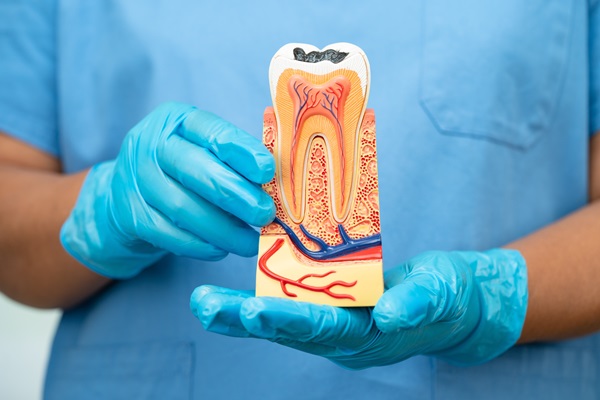Three Signs You May Need a Root Canal

A person may need a root canal to clean out the inside of their tooth and remove infection. However, not all infections present symptoms, and if they do, different people may experience them differently. For this reason, understanding whether you need a root canal can become tricky.
While no two people are entirely alike, most will experience roughly the same signs that their tooth is in trouble. If a root canal is necessary, the indicators may be pain, discoloration, or problems with the gums. Still, these issues can arise from other causes, so always visit a dental professional for evaluation. The longer you leave the issue, the worse it may get — and the more difficult it will be to resolve later.
When a root canal is necessary
The root canal process entails the dentist creating an opening in a tooth (usually on the back surface) to access the pulp chamber, the central location inside the tooth where the blood vessels and nerves are located. The dentist then removes these living tissues in order to treat infections that have infiltrated this vulnerable area.
After the blood vessels and nerves are removed from the center of the tooth, it is hollow on the inside, which can make it weak and brittle. To preserve the tooth and keep it strong, the dentist will insert a material called gutta percha into the hollow space before closing the hole with a filling and capping the structure with an artificial crown. Then, the tooth can remain functional.
A root canal is a last resort treatment that seeks to preserve a tooth rather than losing it to decay or removing it. Indicators that a patient may need a root canal include the following.
When tooth pain is severe
If infection spreads to the central chamber of a tooth, it can directly affect the nerves. Alongside increasing pressure buildup from bacterial waste and inflammation, this can lead to significant pain. Many people report that in the days leading up to their root canal, they were unable to sleep and could not focus on anything because the pain was so substantial and distracting.
Over-the-counter pain relief is not especially effective against discomfort caused by this type of infection. Thus, many people correlate intense and unrelenting tooth pain with the need for a root canal. However, some do not experience such intensity and may instead notice consistent sensitivity, especially to cold and hot foods and drinks.
When the tooth changes color
Blood flow to a tooth is part of what keeps it healthy and contributes to its color. When the blood vessels and nerves inside the tooth start to die, either due to infection or trauma, this change can gradually become visible on the outside surface.
If a tooth starts to turn brown or gray, this is a convincing sign that a root canal may be necessary. The tooth may also react to the decay by calcifying, which can cause it to have a yellow tint. If a patient’s tooth is not the color that they remember or if it does not match the teeth around it, they should have it checked by a dentist.
When the gums are sore or abscessed
The blood vessels that supply the pulp chamber of a tooth are routed through the gums. If infection can gain a foothold inside the tooth, it may travel outward, following the path forged by the blood vessels into other parts of the mouth. This can be dangerous for the person’s health, as the infection can travel anywhere in the body, including the heart. However, most commonly, it will start to cause problems with the gum tissue. Patients who are experiencing unexplained soreness or small, pimple-like bumps on their gums should be evaluated right away.
Is getting a root canal painful?
Many people have heard that getting a root canal is painful. The reality is that it is common for patients to experience profound relief immediately after the procedure is complete because it addresses the cause of their (usually significant) pain and discomfort. Root canals are performed by numbing the nearby nerves first, so a patient should not be in any discomfort throughout the process.
Get root canal treatment as soon as possible
If you suspect that you may need a root canal, visit a dentist as soon as possible. Every day that the infection is allowed to grow, the symptoms can become more severe, and the likelihood of being able to save the tooth decreases. Contact our office to schedule an appointment.
Request an appointment here: https://precisionsmiles.net or call Precision Smiles. at (201) 204-1355 for an appointment in our Hackensack office.
Check out what others are saying about our dental services on Yelp: Root Canal Treatment in Hackensack, NJ.
Related Posts
To manage the pain you will feel after a root canal treatment and to prevent infection, it is critical to follow proper aftercare. The treatment is standard, so it should not be a surprise to your dentist. Once you go home, you will need to follow some aftercare tips to keep your mouth healthy. Here…
Dental professionals use a root canal treatment to stop tooth decay from getting worse and treat the effects of tooth decay. While reversing tooth decay is not possible, root canal treatment can often restore the appearance, shape, and overall health of a tooth that is damaged by a severe cavity.While minor cavities may only need…
Root canal treatment can help with gums and the underlying jawbone. Read on to learn more about this endodontic treatment. This article discusses root canal treatment and how it can improve the health of the tooth receiving the treatment as well as the gums that support it. Gum and tooth health often go together. If…
Root canal treatment is performed to prevent and treat infection in a tooth’s pulp. The term “pulp” refers to the soft tissues housed in a tooth’s pulp chamber. This is the innermost layer of a tooth’s crown, and it is sealed off from the rest of a tooth to prevent oral bacteria and the acids…

